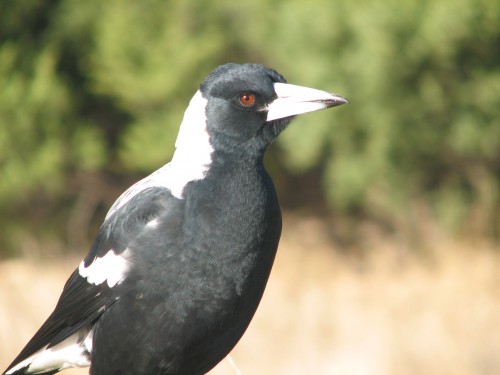Book review: “The fearsome flute players”

The fearsome flute players
I don’t often write about another of my passions – birding – on this site. But I do include book reviews here. I’ve just finished reading a fascinating book about Australian Magpies, one of our most recognisable and best loved birds.
The book is called “The fearsome flute players: Australian Magpies in our lives.” This is not a scientific thesis paper; it is written in an entertaining and engaging manner, incorporating hundreds of stories of ordinary people in South Australia telling their encounters with these wonderful birds.
I won’t give a full review here but rather refer you to Trevor’s Birding, another site I write so you can read an extensive review of this book.
Special Offer:
The publisher a special offer to readers of my birding site. Mention Trevor’s Birding when you order online and you will also receive a CD of 200 photos of South Australia, including some beautiful photos of scenery and water birds.
I strongly recommend this wonderful book.
Good reading – good writing.
Is patience really a virtue?
I am waiting, waiting, waiting.
I am trying to be very patient. If patience really is a virtue, I must be very virtuous indeed. You see, I’m waiting for the results of my Master of Arts Creative Writing thesis paper. Regular readers will know that over the last 18 months I’ve been writing a children’s novel set in Nepal during their recent civil war. I submitted the novel, along with a 10,000 word exegesis essay on the writing of the novel, about mid-December. We were told we might wait 6 to 8 weeks for the results. Two days ago the 9 week mark was reached, so I am trying not to get impatient. Two of my fellow students have heard their results but they submitted the week before me.
This experience has got me thinking about the patience that all writers need. Here are some of my thoughts:
Why writers need patience:
- Some writers need to patiently wait for writing ideas.
- Writers need patience when a story or novel is not going along as it should.
- Patience is needed when life gets in the way of writing schedules, especially if the writer has another job, or a family needing attention.
- You need patience when waiting to hear if a publisher is going to accept your story or novel.
- Once an acceptance is offered by a publisher, patience is needed when waiting to see the work in print.
- When a story or novel has been published, one needs patience waiting for a payment.
- Reading through reviews of one’s work can severely test a writer’s patience.
I’m sure most writers could add many more examples. What can you do while all the waiting is going on?
Waiting productively
- While waiting for a idea for a story, read, read, read and do other creative activities to stimulate the mind.
- While waiting to hear from a publisher, go on with other writing projects to maintain momentum with your writing.
- While waiting for your work to be published, be sending out more work to publishers. Keep your momentum going.
- Remember that waiting is inevitable and a part of the writing process. Use the waiting time productively.
- Don’t give up.
Good writing.
What I am reading: picture books
One of the units I am studying at present is called Writing for children. Our lecturer is award winning author Rosanne Hawke. In our early lectures and workshops we looked closely at how to write picture book texts. Writing this kind of book is a passion for me; I love reading them and sharing them with children – and adults.
One of the things that Rosanne impressed upon us from the very beginning was the importance of reading picture books – as many as we can get our hands on. I’ve always read plenty of picture books, first when I was a teacher librarian, and then as a classroom teacher.
When I retired from teaching four years ago I drifted away from reading picture books as regularly as I used to do. Rosanne has given me the impetus and reason for getting back into this exciting and enjoyable area of books. So once again I’ve reactivated the use of my library card and I am borrowing ten or fifteen a week to read. And I’m thoroughly enjoying the activity.
There is another incentive: we need to keep a reading log of what we are reading, as well as write some short reviews of the books we read. This is a required, assessable component of the course. It is a very enjoyable part of the course I might add.
Good writing.
Good reading.

